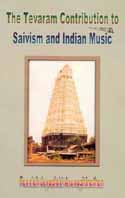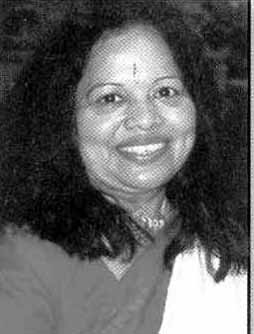|
'The Tevaram Contibution to Saivism and Indian Music' by
Ponniah Jeyaalaki Arunagirinathan!
By Wendy Marr
  P.Jeyaalaki
Arunagirinathan’s book, published in the U.K., is a welcome addition to our
knowledge of Saivite Hinduism and of Karnatic music. It is invaluable too as a
source of the stories of the famous saints of Taminadu, the Nayanmar, which at
one time everyone learned at their mother’s knee. At the same time her book
outlines the philosophy of Saiva Siddhanta giving clear explanations of Tamil
and Sanskrit terms and of the stages of the Marga, or path, of Bhakti, Love of
God, the way to the Soul’s liberation. P.Jeyaalaki
Arunagirinathan’s book, published in the U.K., is a welcome addition to our
knowledge of Saivite Hinduism and of Karnatic music. It is invaluable too as a
source of the stories of the famous saints of Taminadu, the Nayanmar, which at
one time everyone learned at their mother’s knee. At the same time her book
outlines the philosophy of Saiva Siddhanta giving clear explanations of Tamil
and Sanskrit terms and of the stages of the Marga, or path, of Bhakti, Love of
God, the way to the Soul’s liberation.
Beginning with a reminder that Hinduism and particularly Saivism have their
roots in both the Indus Valley Civilisation and in Vedic Hinduism Ms. Jeya
points out that there is ample literary evidence, from around 2nd century B.C,
that while many of the Vedic gods developed absorbing the gods of the Dravidian
- speaking area, the descriptions in the early Tamil Sangam literature of the
qualities of The three-eyed Lord, The Bluethroated One, of his sons Murugan and
Pillaiyar and of his wife the goddess Korravai, point to a southern origin of
the cult of Siva and his family. She shows how Saiva Siddhanta Philosophy, while
based on the Vedas and Upanishads, finds devotional and poetic expression in the
Tevaram and the lives of the Nayanmar, the 63 Saivite saints of the 7th - 9th
Century. Noting that music and religion are inseparable in Indian culture and
considered a divine art form, music’s origin is traced back to the Samaveda and
the oral tradition by which it was passed down father to son or teacher to
pupil. Although the early music has been lost the Tamil epic poem Cilappatikaram
and the Sanskrit seminal text Natyasastra give vivid descriptions of a then
living musical tradition.
In a chapter illustrated by woodcuts from a text of the Periya Puranum and with
some beautiful translated quotations the author tells the stories of the 63
Saivite saints whose ecstatic devotional songs, colourful lives and insistence
that caste was no barrier to love of God profoundly affected Saivite practice
and philosophy in the 7th to 9th century. Icons of these saints are still found
and honoured in South Indian temples.
The account of the loss of the original texts of the Tirumurai, their miraculous
recovery and recompilation as Panniru -Tirumurai in the 10th Century by King
Raja-raja Chola I and a brahmin boy Nampiy Antar Nampi, is supported by one of
several useful tables. A table of the saints’ names together with the social
groups to which they belonged shows the extraordinary effect their Love of God
had on a strictly regulated society. The Tirumurai are heard in temples and used
for household rituals to this day.
The hymns the Nayanmar sang as they went on pilgrimage from temple to temple
were all composed and sung in ‘pan’, that is melody and rhythm. The 103 pans are
listed and clearly analysed to show how they prefigured the modern ragas which
date from 17th.C. parallel pans and ragas are also indicated. A bibliography has
been conveniently included at the end.
Ms. Jeyaalaki is to be congratulated on making acessible to the general reader
and the world at large an important part of the Tamil Literary
Tradition. The Tirumurai, particularly the first 7 books, are rightly
re-asserting their position in the consciousness of the Tamil people.
About Autho:
 Ponniah
Jeyaalaki Arunagirinathan has got her first Music diploma ‘Sangeeta Ratnam’ at
the Ramanathan Music Academy Jaffna, Sri Lanka in 1973. She then obtained
another diploma ‘Sangeeta Vidvan’ at the Central College of Carnatic Music,
Madras in 1976. From 1989 to 1994 she did joint degrees in Religious Studies and
Music and gained Bachelor’s’ Honours and a Masters degree in Area Studies with
special reference to South Asia at the School of Oriental and African Studies,
University of London. Ponniah
Jeyaalaki Arunagirinathan has got her first Music diploma ‘Sangeeta Ratnam’ at
the Ramanathan Music Academy Jaffna, Sri Lanka in 1973. She then obtained
another diploma ‘Sangeeta Vidvan’ at the Central College of Carnatic Music,
Madras in 1976. From 1989 to 1994 she did joint degrees in Religious Studies and
Music and gained Bachelor’s’ Honours and a Masters degree in Area Studies with
special reference to South Asia at the School of Oriental and African Studies,
University of London.
Currently she is involved in a research project and working on her second thesis
entitled ‘The Eleventh Compilation of the Saiva Canon from its Literary,
Devotional and Musical Standpoints. Her two dissertations entitled ‘Tevaram
Contributions to Saivism and Indian Music’ and ‘Devotional and Classical
approaches in Tiruppukal’ were approved by the University of London and gained
first class honours. Many of her articles written on Religions and Music have
been published in www.murugan.org.
Jeya has taught Music in several institutions, including being a tutor at SOAS,
University of London, and she is also, the Chief Examiner for the Oriental Fine
Arts Academy of West London’s National and International Examinations. She
currently Iectures at Tower Hamlets College, London.
Copies of this book which has been published by the Ratnam Foundation, UK
are available for sale at �10 from the author whose contact details are as
follows:-
Ponniah Jeyaalaki Arunagirinathan, 8D, Colville Square,
London W11 2BD, Telephones 020 7727 9059 or 07930 100 743
Jeya.Arunagirinathan@tower.ac.uk |

